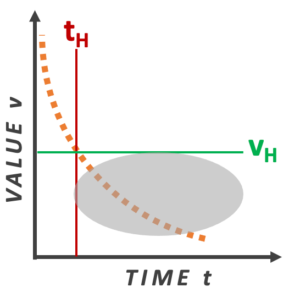
Knowledge Strategy, Organization and Management
Zombie Knowledge
Whenever I teach or lecture, I count it a success when I also discover something new. My knowledge dynamics workshop with a roomful of enthusiastic knowledge practitioners at KMWorld 2022 provided me with a huge insight on the nature of change in knowledge.
What is knowledge dynamics?
Two related constructs formed the core of our discussion:
- the time value of knowledge — the fact that knowledge, if not refreshed, becomes less valuable over time; and
- the speed of knowledge, the velocity at which knowledge is transmitted within a given social space.
I’ve created the term knowledge dynamics to cover both aspects.
A thread in the SIKM forum about the value of lessons learned databases led me to comment (13 January 2022): “[Knowledge codification] is a huge vulnerability for ‘best practices’ and institutional knowledge in general – which, in practice, is typically stored in the form of (inherently static) information. Knowledge – instead of being a buffer against environmental change, as it should be – then becomes a self-contained meta-reality that no longer accurately represents ‘real’ reality. Codified knowledge thus can become a drag on forward progress and innovation! To wit, ‘We already know this, so there’s no need to re-assess the situation – we’ll just plug and play our canned solution.’”
Jane Dysart of KMWorld invented the zingy title zombie knowledge for this phenomenon — and graciously accepted my proposal for a workshop on it.
What is zombie knowledge?
Wikipedia defines zombie as “A mythological animated corpse believed to have been revived from death to haunt the living.” In my workshop, I define zombie knowledge as “knowledge that is dead – stale, out-of-date, out-of-context, and/or no longer applicable – but that appears to be ‘walking’ as if alive.” The problem is that this knowledge often looks fine — but decisions made and actions taken based on it may be significantly flawed.
It came as no surprise that this is a near-universal problem, faced by organizations in a wide range of industries and knowledge maturities. Based on my past experience, I had positioned this as the vertical obsolescence faced by any given knowledge collection/curation activity: Is a given element of data or information still relevant to our current and future strategic situation?
 What did surprise me is that the problem also exists in another related aspect: horizontal obsolescence: Is a given element of data or information still timely — is it still our best-fit representation of the current reality of whatever situation we are describing for our client? It was this aspect that seemed more pressing to the workshop participants, and we discussed various approaches they have been taking.
What did surprise me is that the problem also exists in another related aspect: horizontal obsolescence: Is a given element of data or information still timely — is it still our best-fit representation of the current reality of whatever situation we are describing for our client? It was this aspect that seemed more pressing to the workshop participants, and we discussed various approaches they have been taking.
In both senses, the half-life of knowledge — that point in time (tH in the diagram at right) when it becomes half as useful as it was initially — can be vanishingly short in conditions of rapid change. The grey zone is where zombie knowledge breeds!
The four knowledge roles
ISO 9001:2015 (Clause 7.1.6) from the influential trade group describes the four primary roles to be played by knowledge managers:
1. Determine. Determine the knowledge necessary for the operation of [the Organization’s] processes and to achieve conformity of products and services.
2. Maintain. Maintain and curate that knowledge.
3. Provide. Make knowledge available to the extent necessary to achieve the above goals.
4. Refresh. When addressing changing needs and trends, consider [the Organization’s] current knowledge and determine how to acquire or access any necessary additional knowledge and required updates.
(These are my paraphrases of the ISO language. Patrick Lambe informs me that “Refresh” is now understood to include pruning or eliminating knowledge resources that are no longer relevant — the sources of zombie knowledge.)
Strategy and operations
The second and third of these are the operational roles in managing knowledge — “doing things right” — and the ones that occupy the bulk of the time and effort of most knowledge professionals.
The first and fourth of these are the strategic roles — they determine the planning and available resources for knowledge and ensure that we are “doing the right things.” Often these roles are delegated to executives outside of the knowledge production chain — and too often done in a pro-forma way, if not neglected entirely. This creates the ideal conditions for zombie knowledge to propagate.
Kill the zombies!
Knowledge activities that are placed on perpetual autopilot cannot be fully responsive to the ever-changing needs of clients. The value (measured by its usefulness and strategic relevance) of any knowledge asset or activity erodes when not continually refreshed in the ISO sense.
Zombies can be killed — but a more effective approach is to eliminate the conditions in which they breed in the first place. The same can be said for zombie knowledge — something best achieved by explicitly building a value-centric Refresh cycle into knowledge activities, at minimum on an annual basis.
—
My thanks to Prof. Mike Koenig and Patrick Lambe for their insights on this topic and guest appearances in my workshop, to Jane Dysart of KMWorld for the nifty topic name and, of course, to the day’s highly engaged participants.
Comments RSS Feed